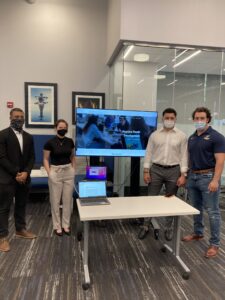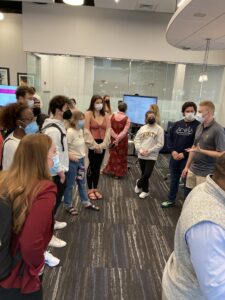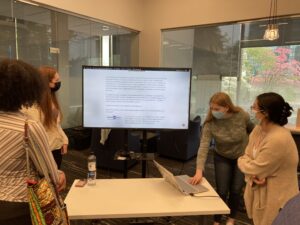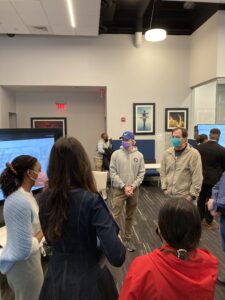Liberal Arts Action Lab Students Present Projects with Hartford Community Partners
Four teams of students collaborated on projects with community partners in the Liberal Arts Action Lab this spring. The students enrolled in two courses – one on community engaged research methods and one specific to their research project. Each project team used the research method skills they learned to answer a research question posed by one of four Hartford community partners. Emily Cummins, Director of the Liberal Arts Action Lab, and Visiting Assistant Professors Tricia George and Jessica Bremner, led the projects in collaboration with a community partner and a faculty fellow on each team.
The students presented their findings to community partners, and Trinity and Capital Community College faculty, staff, and students on May 6, 2022, at the spring digital poster fair. Each team created a public website to share their findings (linked below).
Hear a student from each team summarize their project and findings:
Youth Development

In partnership with ConnectiKids, this project team explored the long-term outcomes participants in ConnectiKids youth mentoring programs have experienced since their participation in the program.
The team reports, “We engaged in a mixed methods approach, surveying individuals who participated in ConnectiKids between 2002 and 2009 to gain an understanding of their current circumstances. A subsection of those survey respondents were interviewed about their experiences with ConnectiKids. Additional data was collected from the National Student Clearinghouse (NSC) on the college and university enrollment and completion rates of the sampled 161 past participants. We found that, by and large, past ConnectiKids participants are likely to attend some form of post-secondary education and if they do, they are likely to complete their chosen program. We also found that the presence of experienced and dedicated mentors was invaluable in providing participants with a feeling of security and self worth that would follow them into adulthood.”
View the project website: https://action-lab.org/youth-development/

Housing and Environmental Justice
Working with Connecticut Fair Housing Center, this project team examined the presence of lead in Hartford and the relationship between systemically racist redlining policies and risk of lead poisoning. Using ArcGIS, Social Explorer, and American Community Survey data, the team made maps and created spreadsheets to determine if correlations were present and to visualize trends.
Their project summary concludes, “While we expected to find discrepancies in Hartford, we found the opposite: almost every census tract in Hartford has high lead risk levels in contrast to our original suspicions. We found that the homogeneity in concentration of poverty and houses with a median age of 1953 within Hartford showed little variation across the city in lead risk and thus no correlation between lead risk and redlining. Our study did find that census tracts in Hartford have that large populations that are below the poverty line and housing units older than the median year built have some of the highest risk of lead poisoning within Hartford, but redlining could not serve as a predictor for these census tracts. We suggest that further research comparing West Hartford and Hartford could support our original hypotheses, for this would showcase the difference in factors that signify exposure to lead poisoning, such as awareness and policies. Nonetheless, our research shows that Hartford is a city in desperate need of lead poisoning remediation.”
View the project website: https://storymaps.arcgis.com/stories/c78f29da28b245cbbceff611d2b65d7b
Community Health Perspectives and COVID-19

This project team partnered with Hispanic Health Council to explore the uptake of the COVID-19 vaccine in Hartford and investigate the main barriers to vaccine uptake. The team spoke with community health workers in Hartford to gain an understanding of common reasons people in the Hartford community are hesitant to receive the vaccine.
Their findings indicate that, “We often use the term “anti-vaxxer” to refer to any individuals who decline to be vaccinated. Our preliminary findings from interviews reveal the picture is more complicated and this homogenous “anti-vax” label does not help us understand people’s hesitancy and, therefore, will not help efforts to increase vaccination rate. Future research should explore this by interviewing individuals about their decisions around vaccines.”
View the project website: https://action-lab.org/vaccine-uptake/
Anti-Racist Education

This group aimed to evaluate the content and availability of anti-racist education trainings in Hartford public schools. Working with the Hartford Federation of Teachers, they collaboratively designed a survey tool in Qualtrics to measure educator perceptions of anti-racist training. The survey is currently being distributed to teachers at Hartford Magnet Trinity College Academy (HMTCA) and has garnered over three dozen responses to date.
The project team says, “The goal is to investigate past anti-racist trainings and determine where this issue stands in the schools. By doing so, suggestions to the BOE and local schools can be made. A digital survey has been built to understand the daily occurrences of race within Hartford’s Public Schools to assess this issue. These will be taken by teachers at Hartford Magnet Trinity College Academy.”
View the project website: https://action-lab.org/anti-racisteducation/
